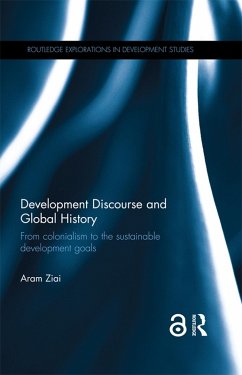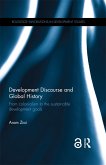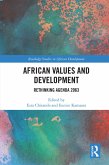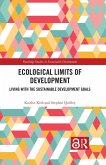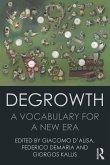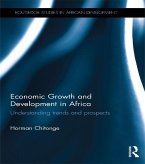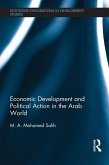Development Discourse and Global History uses the archaeological and genealogical methods of Michel Foucault to trace the origins of development discourse back to late colonialism and notes the significant discontinuities that led to the establishment of a new discourse and its accompanying industry. This book goes on to describe the contestations, appropriations and transformations of the concept. It shows how some of the trends in development discourse since the crisis of the 1980s - the emphasis on participation and ownership, sustainable development and free markets - are incompatible with the original rules and thus lead to serious contradictions. The Eurocentric, authoritarian and depoliticizing elements in development discourse are uncovered, whilst still recognizing its progressive appropriations. The author concludes by analysing the old and new features of development discourse which can be found in the debate on Sustainable Development Goals and discussing the contribution of discourse analysis to development studies.
This book is aimed at researchers and students in development studies, global history and discourse analysis as well as an interdisciplinary audience from international relations, political science, sociology, geography, anthropology, language and literary studies.
The Open Access version of this book, available at http://www.taylorfrancis.com/books/9781315753782, has been made available under a Creative Commons Attribution-Non Commercial-No Derivatives 4.0 license.
Dieser Download kann aus rechtlichen Gründen nur mit Rechnungsadresse in A, B, BG, CY, CZ, D, DK, EW, E, FIN, F, GR, HR, H, IRL, I, LT, L, LR, M, NL, PL, P, R, S, SLO, SK ausgeliefert werden.
Hinweis: Dieser Artikel kann nur an eine deutsche Lieferadresse ausgeliefert werden.
"The book's main strength is the way in which it draws together a wide range of critical discussions of development and condenses from them a coherent and clear critique of development. While discourse analysis (and other poststructuralist approaches) are often criticised for using obscure or unnecessarily complex language, Ziai's book is clear and jargon-free. Furthermore, it begins with a very accessible discussion of poststructuralism and discourse analysis rather than assuming familiarity with the terms that will be used in the rest of the book." - The Journal of Development Studies, Sally Matthews, Rhodes University
"this book is a great contribution to critical development studies. The reader will find abundant, solid, coherent, empirically based arguments proving that the development discourse is an exemplary case of a knowledge-power discursive formation. Instead of assuming that 'development' offers a solid framework to apprehend injustice and human suffering, Ziai shows the profound onto-epistemological complexity of the problem - arguably the only way to rethink the issue in order to find different ways to effectively promote change." - Progress in Development Studies, Juan Telleria, University of Essex and HEGOA Institute University of the Basque Country (Spain)
"Development is a complex social, economic and political phenomenon. While various kinds of aid have been delivered from developed to developing countries in the name of development, there remain many development issues in the developing countries which are still dependent on the guidance of development theories, such as liberal economic theories, Marxist theory, and dependency theory, as well as various development programs and projects at both national and international levels. What is development and How can development phenomena be understood? In this book, Aram Ziai explores the concept and nature of development by skilfully combining his arguments with empirical materials, drawing on the Foucauldian archaeology and genealogy methodologies.[...] Ziai's book outlines a productive interdisciplinary research project, bringing together discourse analysis and development studies, and will be a good and informative read for scholars and students in the fields of discourse analysis, development studies, global governance studies, international management, international politics, sociology and cultural studies." - Discourse & Communication 12(6), Reviewed by Yuan Chang, Zhejiang University, China

